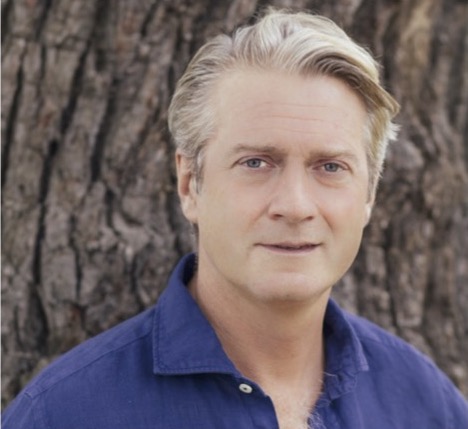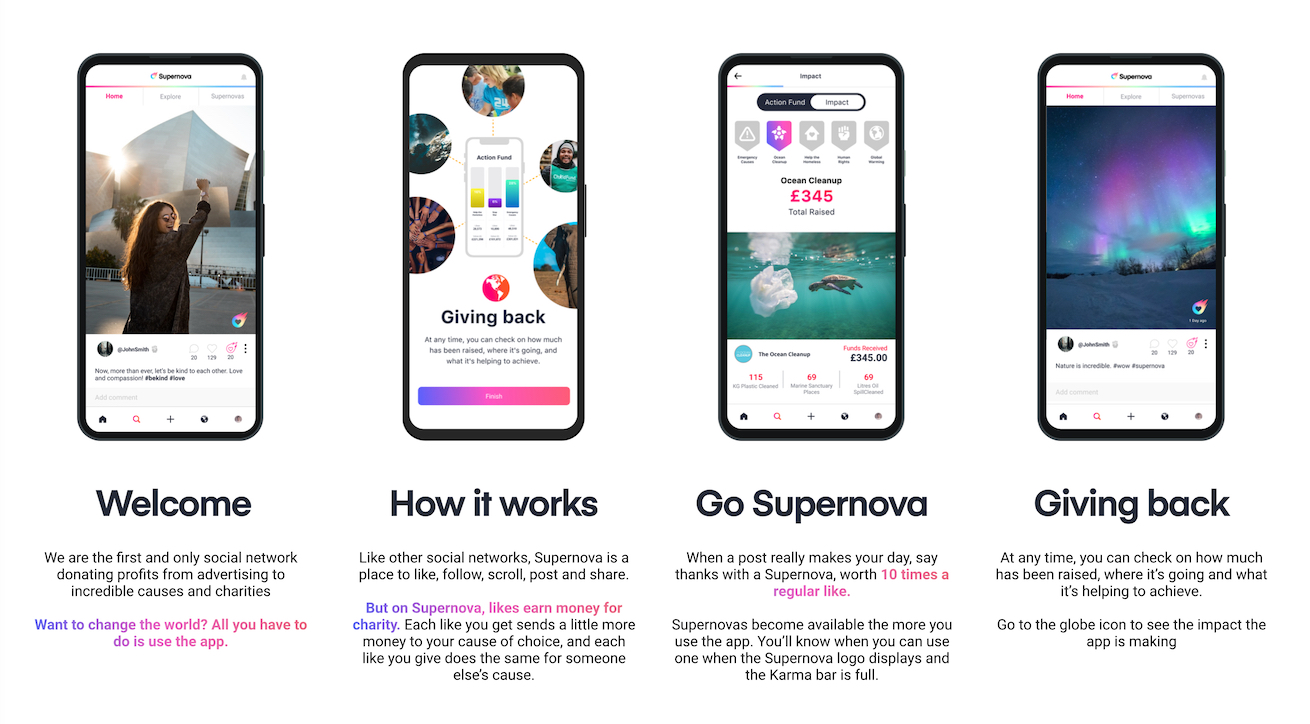Supernova is a new app that has now gone live on the Apple and Android app stores billing itself as a new “ethical alternative” to Instagram and Facebook, where most of the ad revenues go to charities. Does it have a chance?
It would be fair to say that after many years of either watching Facebook become a panopticon-like prison which jauntily suggests you join private groups to topple the US government or doom-scrolling through Instagram, where you and your teens’ mental health is slowly eroded, many people would be quite happy with an alternative social media platform with – please God – higher-minded principles. A few of these have come and gone over the years (RIP Path) but none have managed to wrestle the masses away from Zuckerberg’s vice-like grip.
Perhaps what people have forgotten is that the only reason Facebook (and by extension, Instagram) are as big as they are is that their advertising revenues prop up these free services. If advertisers had somewhere else to go that could capture the social media crowd with a compelling enough app, Facebook and Insta would start to feel some heat. At least, that’s how the theory goes.
Now, a British entrepreneur, who knows the ad industry inside-out, plans to take on these giants with a solution of his own, designed to appeal to Millenials and Gen Z-ers who are generally led by a desire to support good causes far more than previous generations.

Dominic O’Meara, founder and CEO of Supernova
Founder and CEO of Supernova, Dominic O’Meara, a former Saatchi advertising guru and Bafta Award winner who is largely bootstrapping the startup, said sponsors like ASICS and charities like MQ have chosen to join at the launch because of the app’s “inclusive social network with user safety at it’s heart. It’s exactly this gap that Supernova fills and we’ll be scaling into that gap as the social network that gives back in the months and years ahead.”
He added said: “Our technology and accessibility make it possible for the world to genuinely help each other using social media and the power of advertising. And to see transparently exactly how and where their actions are helping at all times.”
Supernova plans to do this by preventing toxicity on its platform (more on how in a moment) and aiming to create a place where users feel “safe, secure and encouraged to have positive, inspiring, life-affirming interaction with their friends… without having to witness and endure hate, racism, homophobia and extreme politics.”
The business model is simple. It will give away 60% of its advertising revenue to global charities, with the money distributed according to members’ preferences across the following subjects: Climate Change, Animal Welfare, Emergency Causes, Health & Wellbeing, Help the Homeless, Human Rights, Mental Health and Ocean Cleanup. Which causes get the most money is determined by users.
If it can capture 1% or more of the global social media advertising market, says Supernova, it would be passing £600 million a year to charities. By contrast, the equivalent amount coming from Facebook and Instagram would pump out £51 billion. But of course, all that cash currently goes into Zuck’s coffers.
Facebook and Instagram famously say they ban hate-speech, but of course, we know this rarely happens in practice. Supernova claims it will have “100% human moderation” to begin with, based on its Community Standards, and even pledges a whole Charter for users.

Supernova app
So what is the app like?
Well, immediately you can see the similarities with Instagram. Users can share photographs and videos along with comments and messaging. Users can follow or be followed (although one or two bugs remain – my profile appeared to auto-follow users I hadn’t selected).
Users can also set an account to private, explore, follow and block unwanted users – basically most of the usual social media tools we’ve become used to.
What is different here is in the underlying mechanics.
Firstly, users can nominate in their profile which charitable field they want to support with the cash that Supernova gleans from its ad partners.
Next, instead of inducing narcissism in users, ‘Likes’ work like votes for a share of the ad revenue for charities. When a user’s post is Liked, their choice of charity will earn a bigger slice of the ‘Supernova Action Fund’ as a donation.
When a post gets a Superlike, or a ‘Supernova’, it gets 10x the regular ‘Like’ in votes for the poster’s cause. But there’s a catch, to give a Supernova the user must first earn sufficient ‘Karma Points’, which are somehow determined via the user charter. Presumably this is to incentivize engagement.
So far, global sports brand ASICS is the first to sponsor Supernova and mental health charity MQ Mental Health is the first charity selected to benefit.
Next up, unlike Instagram (but more like Facebook) Supernova has a ‘Groups’ facility where users can congregate in, well, groups.
O’Meara claims over £1 million has been invested in Supernova from a ‘friends, family’ funding round, with a larger raise planned for the first half of next year with institutions.
I asked about human moderation. I was told by O’Meara that it would be done by “a trained team based in the UK and they cover in shifts managed by us 24/7. They are young, smart people mostly computer science grads/ undergrads and our intention is to develop them within the company as we grow, so that our team has an affinity and empathy for the community right from the start.” However, they will be assisted by machine learning as the company scales, he said.
“Supernova will free from the toxic, radicalizing content that is actively promoted through AI on other platforms. As a result, Supernova will certainly not be for everyone, and that is deliberate,” he said.
Will it allow nipples on the platform, which are famously banned from Instagram?
“It all depends on the context and nature of the post and subjects within it, but it would certainly be checked for accordance with our Community Standards. If in breach, it would be removed,” he said.
If the context was a woman explaining breastfeeding, would it be allowed, I asked?
“Yes, probably, so long as the intent was clearly informative and addressing a genuine aspect of the subject. If the intent or content was in our view disrespectful/ harmful/ otherwise negative towards the subject and our community, then it would infringe our Community Standards and our Charter and would be removed,” he said.
So, what’s in it for advertisers?
O’Meara said: “Being part of a ‘new era’ social media that is doing the right thing is great for their brands (PR) as opposed to being part of an old toxic order that potentially harms their brands. Deloitte tells us that 80% of millennials only want to buy from brands that put others’ interests above their own. Large advertisers are fed up with the social media status quo: I met one yesterday with a global budget in excess of $10BN who told me exactly that.”
“Our product is entirely scaleable and if we reach only 1% of millennials we’ll serve 40M people with our sponsor’s ads every day. That’s quite enough as advertisers are now looking for ‘Quality over Quantity’. The Facebook boycott of 1K+ advertisers spending $4.2BN was an early sign of this and it hasn’t gone away, there just hasn’t been an alternative offer available to them and now there is: Supernova,” he added.
Whether Supernova will survive, or perhaps become another “MyEye” – the streaming social media app launched by David Beckham which suck without a trace – remains to be seen.
Questions remain over whether being a sort of ‘vanilla’ social network where few tough or controversial subjects ever appear will be enough to attract users. And with content moderated by potentially biased humans, will Supernova end up being sued by those who dislike its decisions?
But at least from this first showing, Supernova appears to be off to a good start.

